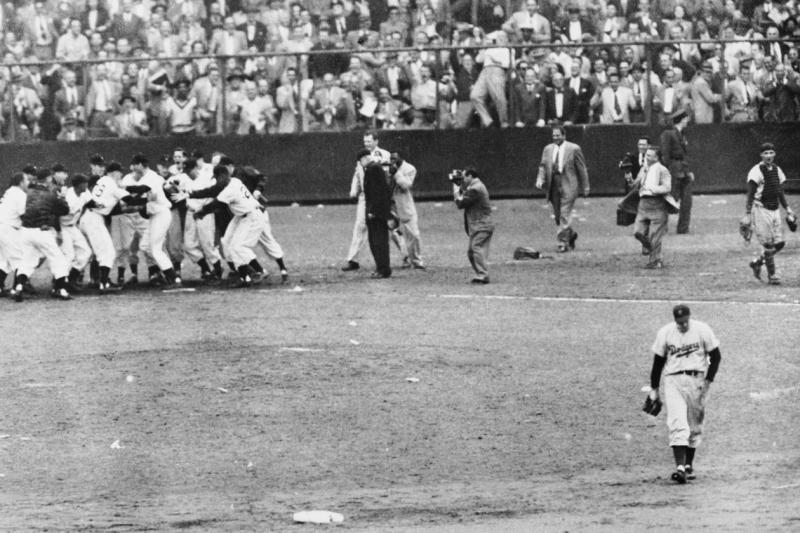'Losers' Review: The Lessons of Defeat
By: Roger Lowenstein (WSJ)



Floyd Patterson, who was the heavyweight boxing champion when people cared about such things, began to talk about himself in a way he never had before when he started losing. What followed his two knockouts by Sonny Liston was hurt—“a confused hurt—not a physical hurt.” It was the hurt of having to leave the ring “and face those people.” Imagine, Floyd Patterson purchased false whiskers and a mustache to wear as a disguise. Yes, Floyd Patterson, as fearsome as any boxer ever, considered himself a coward.
Patterson revealed his pain to the writer Gay Talese in Esquire in 1964. “The Loser,” as the article was called, is one of many compelling pieces gathered in “Losers: Dispatches From the Other Side of the Scoreboard.” Edited by Mary Pilon and Louisa Thomas—both sportswriters and contributors to the book as well—“Losers” ranges over time and a variety of sports, from the 1908 Olympic marathon, covered by Arthur Conan Doyle, to the Brooklyn “Bums”—oops, Dodgers—of the 1950s, to the ill-mannered, underachieving and maddeningly blasé Australian tennis star Nick Kyrgios, who once asked a fan, mid-match, to get him a beer.
“Losers” considers table tennis and sailing, summer-league basketball and bullfighting. Its subjects all missed in some way—born on the wrong side of the tracks, foiled by personal failings or injuries or bad luck. “The locker rooms of winners are crowded,” the editors note in a spot-on introduction; those of losers, “desolate and awkward.” Yet while victory brings a fleeting transcendence, “losing reveals something raw about what it means to be human.” Red Smith, the great sportswriter of the last century, after wrongly predicting the winner of a prize fight, once acknowledged his error with the caustic admission to a fellow writer: “My boy, crow is an acquired taste.”
We all acquire the taste sooner or later. We all lose. Some of the athletes profiled in “Losers” are people you’ve never heard of, such as Charlie Rowan, an amateur boxer who loved fighting so much that he did it for free but undid himself with a world of personal trouble: drugs, guns, armed robbery, you name it. Or Ernesto Sobrino, a Spanish bullfighter performing as a banderillero, one of the old men of the ring whose high-risk vocation is to make the bullfighter look good. Barry Newman, my former Journal colleague, wielding his pen like a matador, explains that banderilleros are thick-waisted versions of young matadors: “They run at the bull with two barbed sticks and try to place them in its hump before the matador moves in for the kill.”
Some of the subjects are famous, or rather, infamous. Almost required is the entry on the Dodgers’ Ralph Branca, who threw an ill-fated pitch to Bobby Thomson of the New York Giants, who smacked a home run that cost the Dodgers the pennant in 1951. Branca, sensitively portrayed by Joshua Prager, pounded his fist against a concrete wall. He stood under a cold shower. He wept. When he left the Polo Grounds, he was met by his fiancée and a priest. The priest said that it could have happened to anyone. “Yes, father, but why did it have to be me?”
All of these losers were good at something, some of them very good. As Brian Platzer writes of a pair of table-tennis whizzes, “these guys are geniuses in one very small area of life.” Loss for them was relative; competition at a high level put a burden on their friendship. Some of the losers simply choked. All through the summer of ’64, my camp mate gushed over his hometown Philadelphia Phillies. By Sept. 20, they led by 61/2 games, seemingly a sure bet to return to the World Series for the second time since 1915. (James Andrew Miller, the author of “The ‘Dewey Defeats Truman’ of Sports,” mistakenly says the first time.) The Phillies printed postseason tickets and sold 90,000 to adoring fans. The tickets said, “Phillies 1964 World Series.” Then the Phils lost 10 straight, and the Cardinals won the pennant.
And some subjects simply had the misfortune of coinciding with somebody better. Stefanie Loh records the story of Jeremy Taiwo, a decathlete, who could never beat Ashton Eaton, his slightly older rival and friend and the winner of Olympic gold medals in 2012 and 2016. “I sometimes wonder,” he admitted, “how much more hardware I might have bagged if I hadn’t come into the sport two years after a once-in-a-generation decathlete.”
I wasn’t persuaded by Ryan O’Hanlon’s “That Loser LeBron,” so titled because LeBron James, the best basketball player of his generation, has lost twice as many NBA finals as he has won (six to three). Mr. O’Hanlon finds this “odd,” although Dan Marino never won a championship; nor did Ted Williams. Three championships isn’t exactly loser material.
No anthology on losing would be complete without Boston, my adopted city. It used to be as adorable as a lost puppy—all rusted overpasses and broken hearts. Now it is title-town: endless winners’ parades and gleaming towers. Samuel Graham-Felsen, who once sold peanuts at Fenway Park, has the grace to recognize that the city of his childhood was united by its collective torment. He still roots for the Celtics, Sox and Pats, but, after so much winning, he admits: “Each year, I find myself cheering with less and less fervor.” He misses the old Boston, with its cursed and long-suffering fans. He misses the tribal oneness and deeper feelings that came with losing.
Mr. Lowenstein is the author of “America’s Bank: The Epic Struggle to Create the Federal Reserve.”



